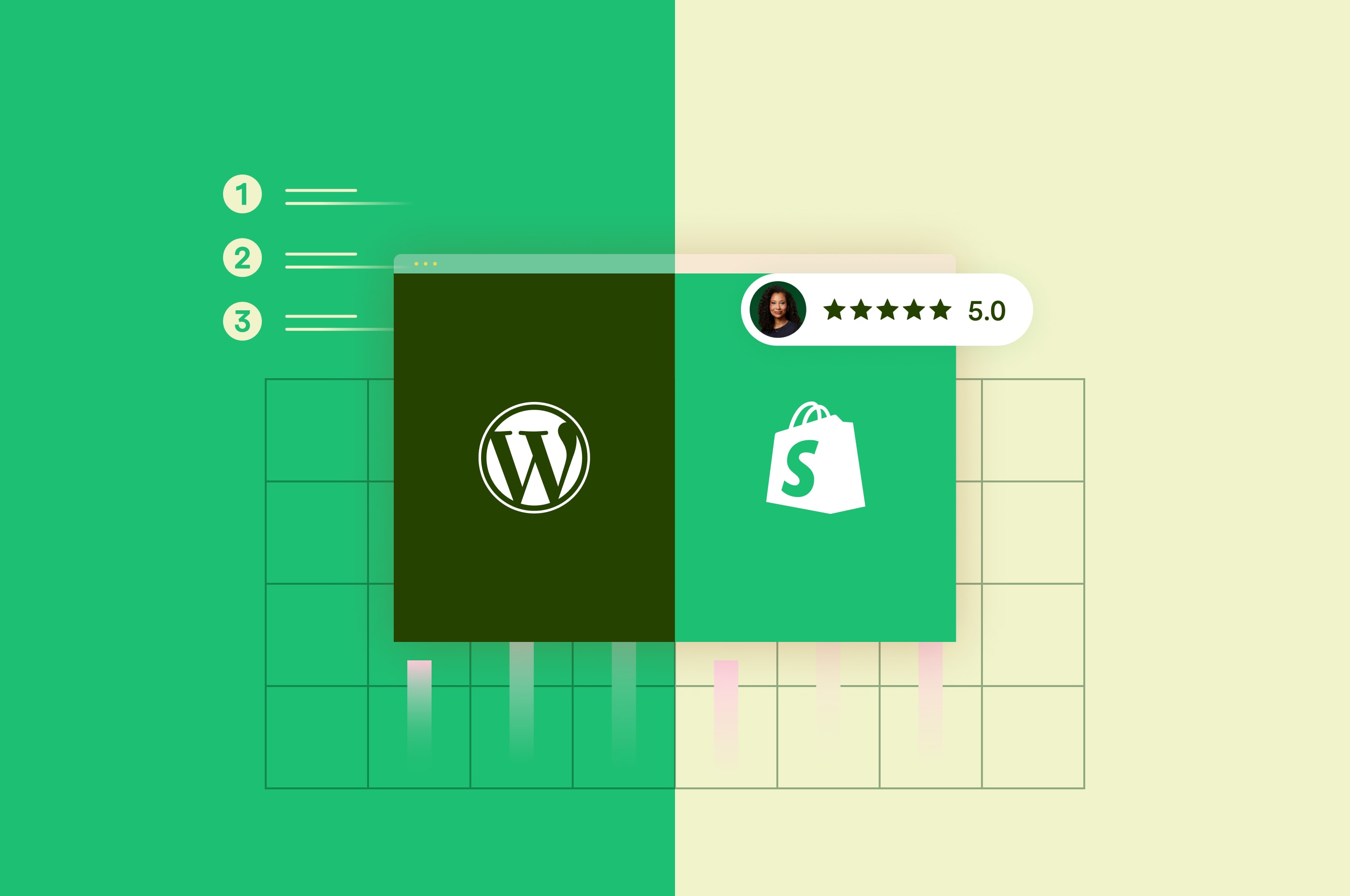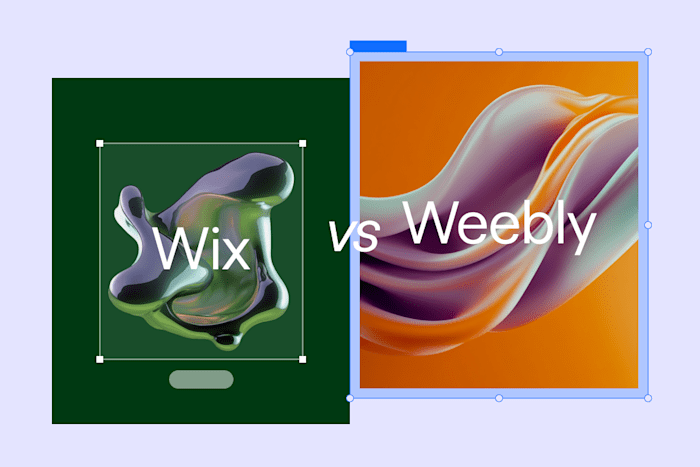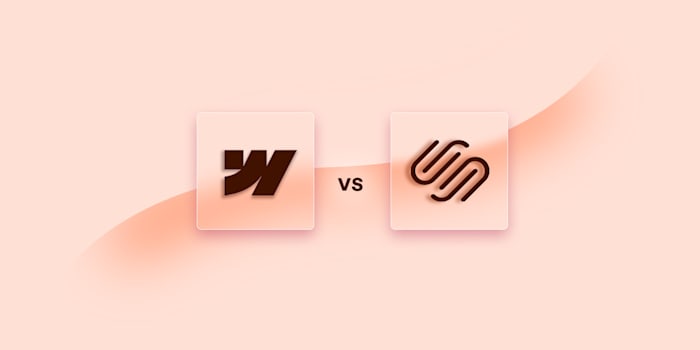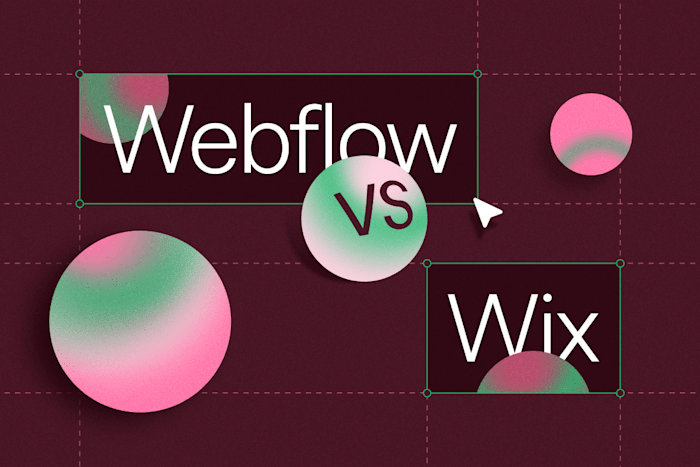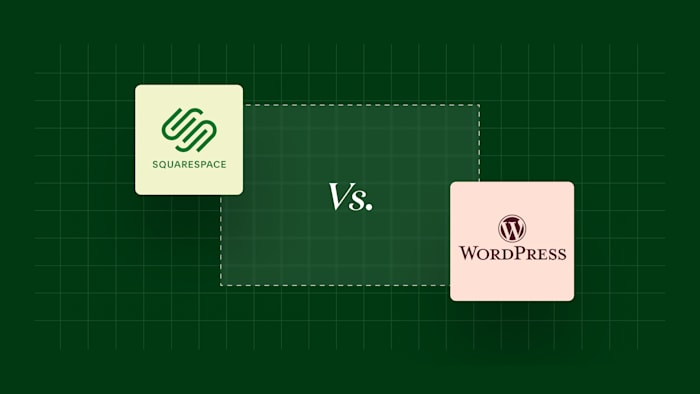9 Best Website Builders for 2025
Discover the best paid and free website builders for your brand.
 February 4, 2025
February 4, 2025 15 minute reading
15 minute reading
Hands down — your small business needs a website to attract customers and make sales. Whether showcasing products, booking services, or building your brand, your online presence can make or break your success.
Website builders have changed the web design industry. They allow small businesses to establish themselves online easily. These platforms offer intuitive tools, stunning templates, and powerful features that make creating a professional-looking site
Check out this guide to see the top 9 website builders for small businesses. You’ll learn how to choose the right website builder based on your business needs, goals, and budgets.
Our methodology for testing website builders
Fiverr is committed to providing objective reviews when comparing online tools. The author, Michael Keenan, has personally tested nine website builders to build sites from scratch for his freelance business, agency, local business in Arizona, corporate restaurants, and more.
Each website builder was considered based on:
Ease of use: We built a basic website with each platform, noting the process's simplicity. This included evaluating the drag-and-drop interface, template selection, and overall navigation.
Customization options: We explored each builder's design tools, testing how easily we could modify templates and add unique elements. We also assessed the range of design choices available for different website styles.
Integrations: We tested connecting each builder with common tools like Google Analytics, social media platforms, and e-Commerce solutions. We evaluated both the availability of integrations and their simplicity of setup.
Budget considerations: We compared pricing plans across builders, noting any hidden fees or essential features locked behind paywalls. We also considered the value offered at each price point relative to the features provided.
We’ve also welcomed users from various industries to share their experiences using the selected website builders.
1. Wix
Best for: Building a free website
Reasons to use Wix
Beginner-friendly with lots of tutorials
Over 900 website templates
Free plan without credit card
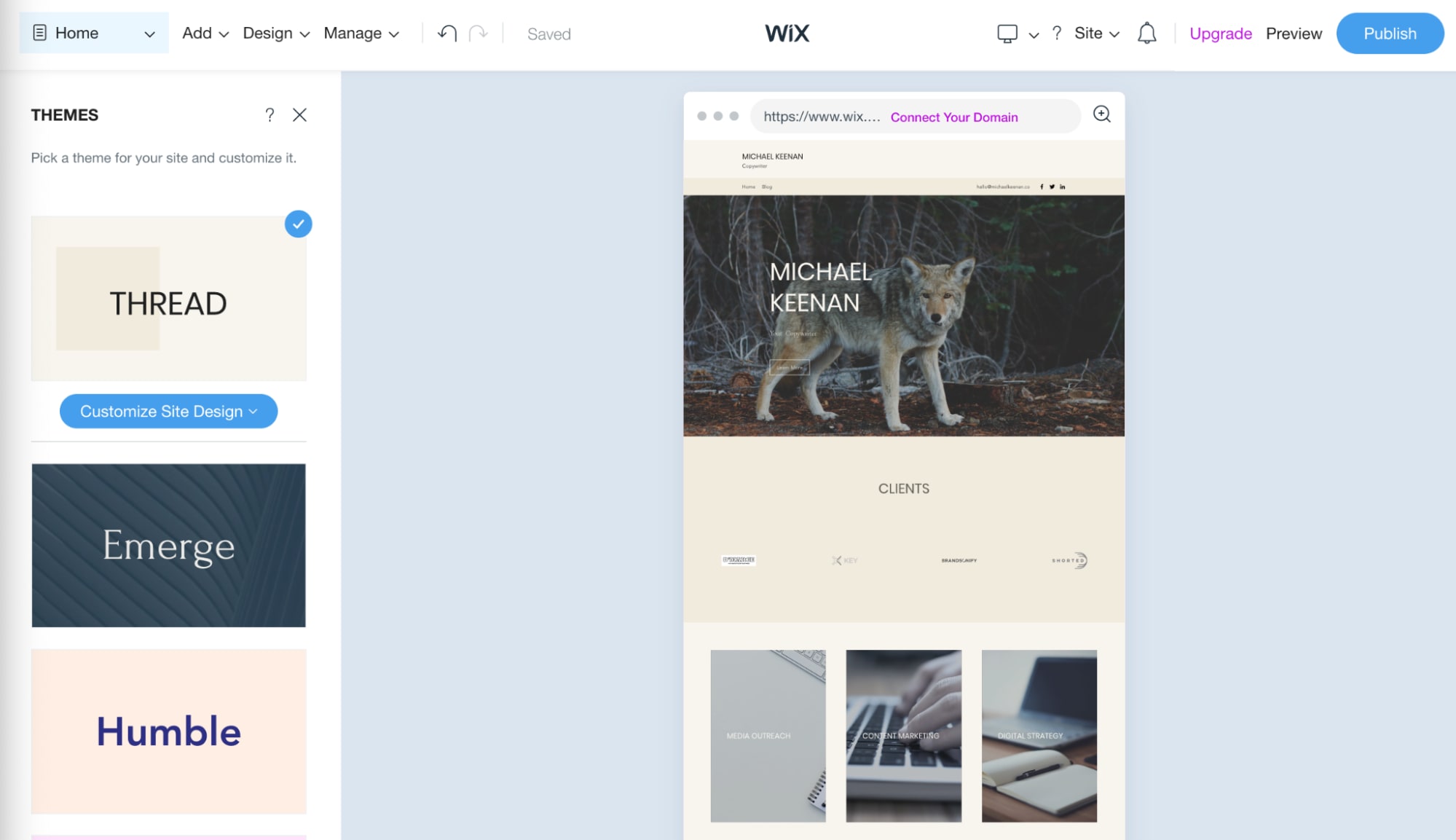
Wix
Wix Specifications
Free domain: Yes
Bandwidth: Unlimited with paid plans
Ecommerce: Yes
Mobile app: Yes
Analytics: Wix Analytics
Wix is a responsive website builder that allows users to build their own websites without coding knowledge or prior design experience. The process was intuitive, with a user-friendly editor that allowed for quick placement and adjustment of elements. New users should find the learning curve manageable, thanks to clear tooltips and guided tutorials.
Wix's extensive template library and customization tools offer easy modification of layouts, colors, and fonts for unique designs. Advanced users can add custom HTML/CSS for extra flexibility, though most won't need to touch the code.
Wix is a popular option for small businesses, The majority (31%) of website-builder sites are created with Wix.
“I ended up choosing Wix for its affordability, user-friendly interface, and customization options,” says Dmytro Kondratiev, CEO of LLC services. “Since launching my website, I’ve seen a 40% increase in sales thanks to high site traffic.”
Wix has over 900 templates in its library, with drag-and-drop functionalities. Even though Wix is a no-code platform, custom code functionalities can be enabled to make source code changes. However, you’ll need HTML or CSS knowledge for this.
If you need advanced customizations like an API integration or third-party payment gateway, you can get Wix web development services.
While Wix offers a free plan, it includes limitations like Wix branding and ads. Paid plans provide better value with features like free domain names and SSL certificates. E-commerce functionality is reserved for higher-tier plans.
Wix Features
In-built SEO and analytic tools for higher-tier plans
Import an existing website into Wix with the site transfer tool
Customize the look of your site by using pre-made themes already optimized for mobile devices
Build your own theme with HTML/CSS code
eCommerce functionality if you want to sell products online
Appointment booking and social media integration
Free domain name and web hosting package included in paid plans
Wix Pros
User-friendly platform
Attractive templates
SEO support
SSL certificate
Tools and integrations
Wix Cons
Limited storage options, not great for very heavy websites
eCommerce plans are expensive
Loading speeds are slower than some competitors
No in-built SEO or analytics for basic plans
Who is Wix best for?
Small businesses
Freelancers
Creative professionals
Bloggers
Restaurants
Non-profits
Event planners
Wix Pricing
Free plan: $0/month (with ads)
Light plan: $17/month
Core plan: $29/month
Business plan: $36/month
Business Elite plan: $159/month
Find a Wix Website Developer for Hire
2. Squarespace
Best for: In-built SEO
Reasons to use Squarespace
Native features like email marketing, SEO, and social media integration
Strong track record for uptime
Beautiful templates for visual-heavy websites
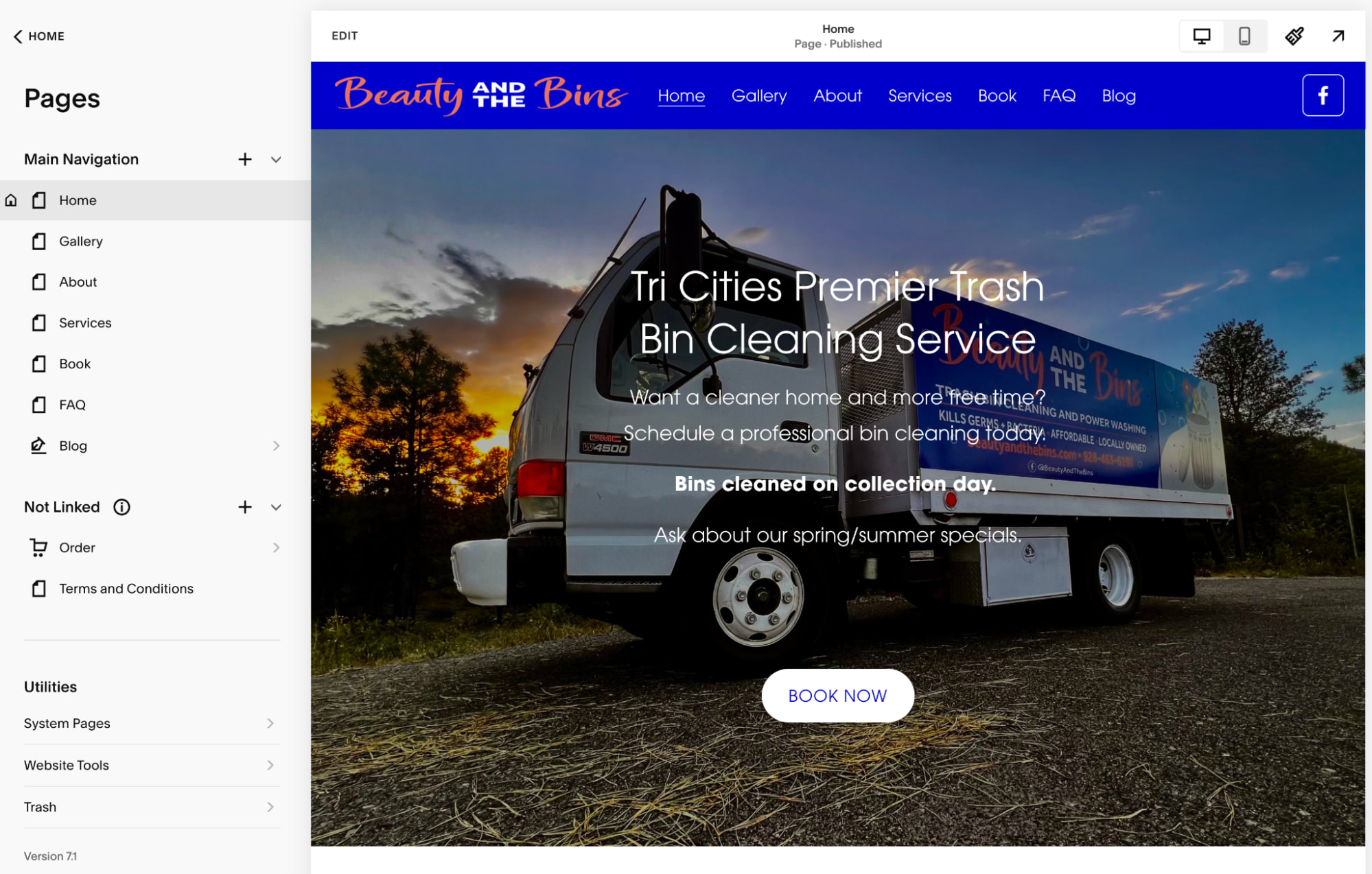
Squarespace
Squarespace Specifications
Free domain: Yes
Bandwidth: Unlimited
Ecommerce: Yes
Mobile app: Yes
Analytics: Built-in
Squarespace is a website builder with 100+ templates and a drag-and-drop interface for quickly building a visually appealing website.
Squarespace's interface is sleek and intuitive, making it easy to build a professional-looking site quickly. The drag-and-drop editor allows for effortless element placement, while the dashboard provides straightforward navigation between site sections.
Squarespace shines with its native email marketing, SEO, and social media integrations. During our tests, connecting tools like Google Search Console was seamless. However, the platform offers fewer third-party integrations compared to some competitors.
Why is Squarespace the best website builder for increasing rankings? Because of these technical SEO features:
Google Search Console integration: Analytics dashboard shows keyword performance and traffic sources
SEO Page settings: Customize page titles, descriptions, URLs, and images
Sitemaps: XML format sitemaps are already added
Search engine indexing: Automatic markup on product and event pages
Mobile optimization: Mobile responsiveness is an SEO best practice
Squarespace also offers a free custom domain, SSL certification, and eCommerce features.
“I chose Squarespace because I wanted a straightforward and intuitive website builder so I could start quickly,” says James Beattie, founder of We Tested. “The customer service was super responsive whenever I ran into issues while designing, which sealed the deal for me.”
Squarespace Features
100+ templates, easily find one that fits your brand perfectly
Easy-to-use dashboard
Drag-and-drop sections, layouts, and custom code injection options.
Integrated SEO features (meta tags, page titles) and in-depth analytics to track performance.
Integration with Acuity Scheduling for managing bookings and appointments.
Wide variety of features such as email marketing, SEO, and social media integration
AMP formatting (accelerated mobile pages) for fast speeds on mobile devices
Squarespace Pros
Wide collection of themes and templates
Great for blogging
Ecommerce support
Content creation tools
Advanced security and privacy
Excellent customer support
Squarespace Cons
Bare bones eCommerce capabilities
Fewer add-ons and integrations with apps than similar website builders
Custom code features available only for Business plan
Who is Squarespace best for?
Photographers
Graphic designers
Artists
Bloggers
Musicians
Ecommerce businesses
Podcasters
Squarespace Pricing
Personal plan: $16/month
Business plan: $23/month
Commerce Basic plan: $28/month
Commerce Advanced plan: $52/month
Find a Squarespace Website Developer for Hire
3. Duda
Best for: Managing multiple websites
Reasons to use Duda
Great design tools and customization options
Slick templates
AI automation Tools
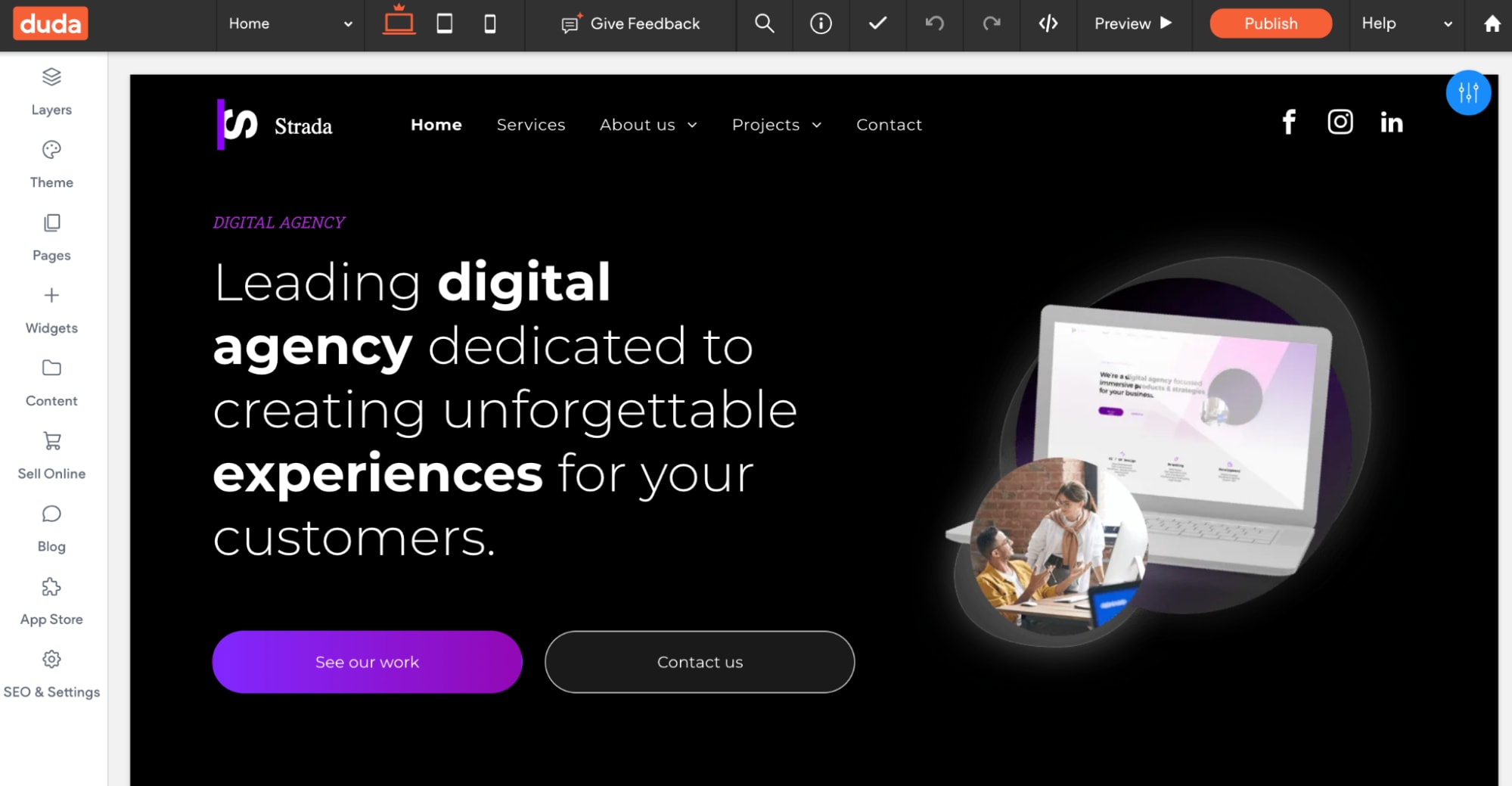
Duda
Duda Specifications
Free domain: No—must purchase one to connect to your site
Bandwidth: Unlimited
Ecommerce: Yes
Mobile app: Yes
Analytics: Built-in
Duda is an easy-to-use content management system (CMS) that lets you build your website in minutes. It was created by the same people as WordPress and shares many similarities with its predecessor.
The platform's clean and well-organized layout allows users to navigate between different site sections effortlessly. New users will appreciate the straightforward process of selecting and customizing templates. It’s very easy to modify layouts, colors, and fonts to match specific branding needs.
Duda offers a powerful system for creating websites in 55+ languages, with multi-language responsiveness. While its app store is more limited than that of some competitors, the available integrations cover most essential needs. Connecting popular marketing tools and e-Commerce platforms was straightforward.
“Duda is superior in every way. I can't imagine how our company would be able to manage building as many sites as we do daily with another platform.” Paul Altobelli, Website Product Lead at hibu.com.
Duda Features
Over 98 professionally-designed, responsive templates
Includes tools like white labeling, client permissions, stats & analytics, and client billing.
The Agency plan enables more team members to collaborate and build multiple sites.
Team plans offer user permissions, collaboration features, and a widget builder.
Over 40 payment gateways with no transaction fees.
A connected content library helps manage images and files, while client-focused tools assist in branding and marketing.
Duda Pros
Intuitive drag-and-drop feature to easily add content to your site.
No limits on how much content you can add to your site.
Duda’s Website Personalization Tool allows you to customize your visitors’ user experience based on their location or online behavior.
Duda Cons
Duda offers an app store, but the range of applications is somewhat restricted compared to Wix, Shopify, and Weebly.
There's no free plan (just a 30-day trial period), and Duda's premium plans begin at higher prices than most competitors.
Who is Duda best for?
Agencies
Multilingual websites
Designers
Web developers
Small businesses
Franchises
Enterprises
Duda Pricing
Basic plan: $19/month
Team plan: $29/month
Agency plan: $52/month
4. WordPress.com
Best for: Customization
Reasons to use WordPress
Over 8,000 free themes
Over 50,000 compatible plugins
Free version with lots of features
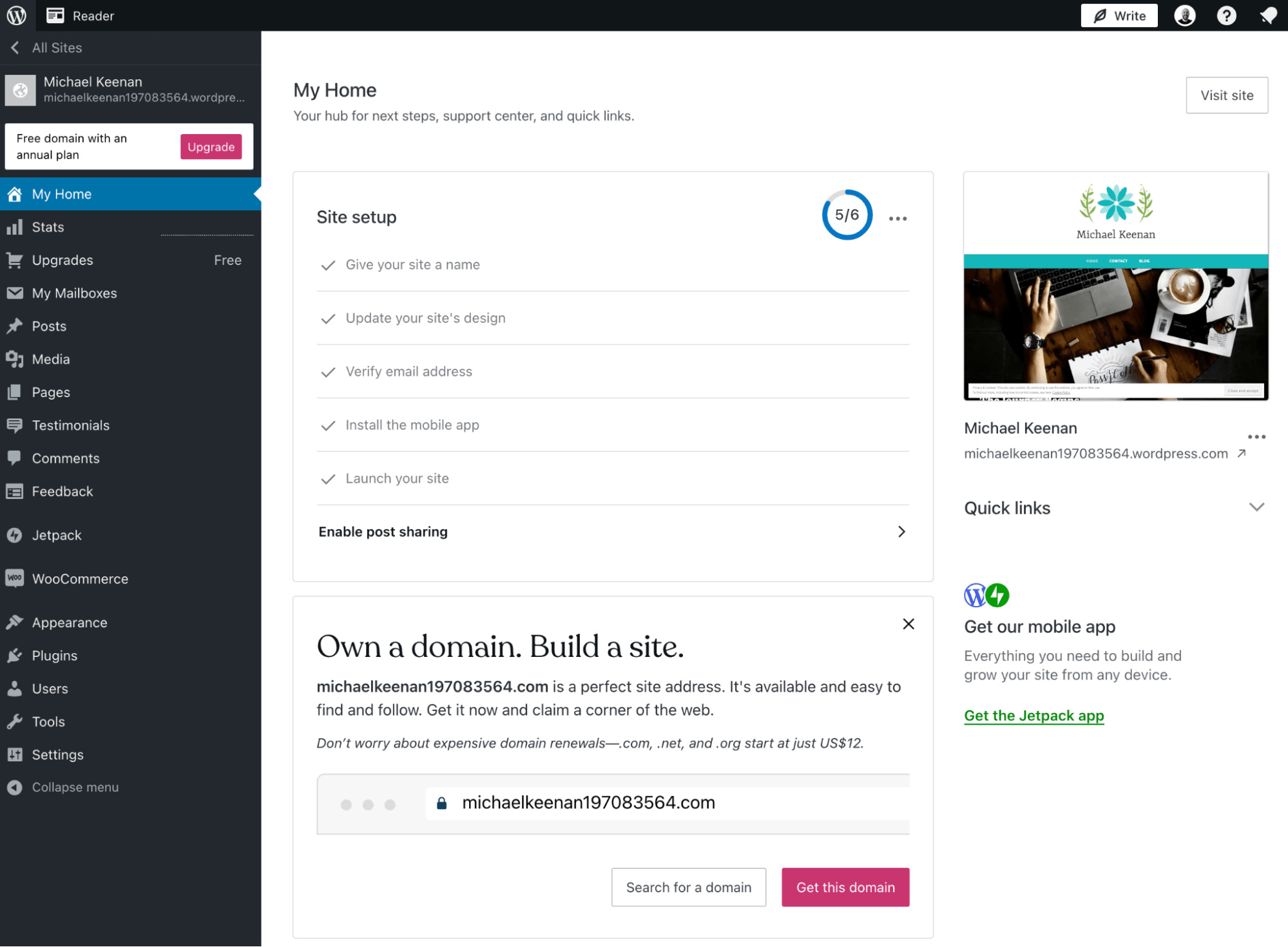
WordPress
WordPress Specifications
Free domain: Yes, for one year
Bandwidth: Unlimited
Ecommerce: Yes, with plugins
Mobile app: Yes
Analytics: Yes, with third-party analytics plugins
Eighteen percent of marketers use WordPress as their content management system (CMS) of choice. WordPress.org is a versatile and customizable platform, popular for a variety of websites, including blogs, portfolios, eCommerce stores, and news sites. However, its user-friendly interface and extensive plugin library can also make it attractive for individuals and organizations with limited technical expertise.
Note that Wordpress.org and Wordpress.com are not the same. WordPress.org is a free version of the WordPress CMS, but doesn’t include hosting services.
WordPress.com is a paid hosting provider and website builder that hosts WordPress-powered websites.
WordPress.com offers above-average design flexibility—at the cost of a higher learning curve. Beginners with zero technical background can accidentally ‘break’ by using incompatible plugins, outdated themes, and custom code errors.
WordPress Features
High level of control over site design
Thousands of WordPress themes (free and paid)
Install WordPress plugins to customize your site's design and functionality
SEO optimization features
Social media integration
Accessible WordPress.com learning resources
WordPress Pros
User-friendly interface for beginners
Community support with resources and tutorials
Regular updates to enhance security and performance
Ability to build custom themes
WordPress Cons
Steep learning curve—business owners typically get Wordpress development for troubleshooting
Free plan has limited 1GB space and uses a subdomain (e.g., yoursite.wordpress.com)
Who is WordPress best for?
Bloggers
Ecommerce stores
Non-profits
News and media organizations
Portfolio sites
Membership-based businesses
Developers
WordPress Pricing
Free plan: $0/month
Pro plan: $15/month when billed annually
Hire a WordPress developer for your website today
5. Shopify
Best for: Ecommerce businesses
Reasons to use Shopify
Sell through Instagram, Amazon, Facebook, eBay
24/7 live support
Easily scalable so works for businesses of all sizes
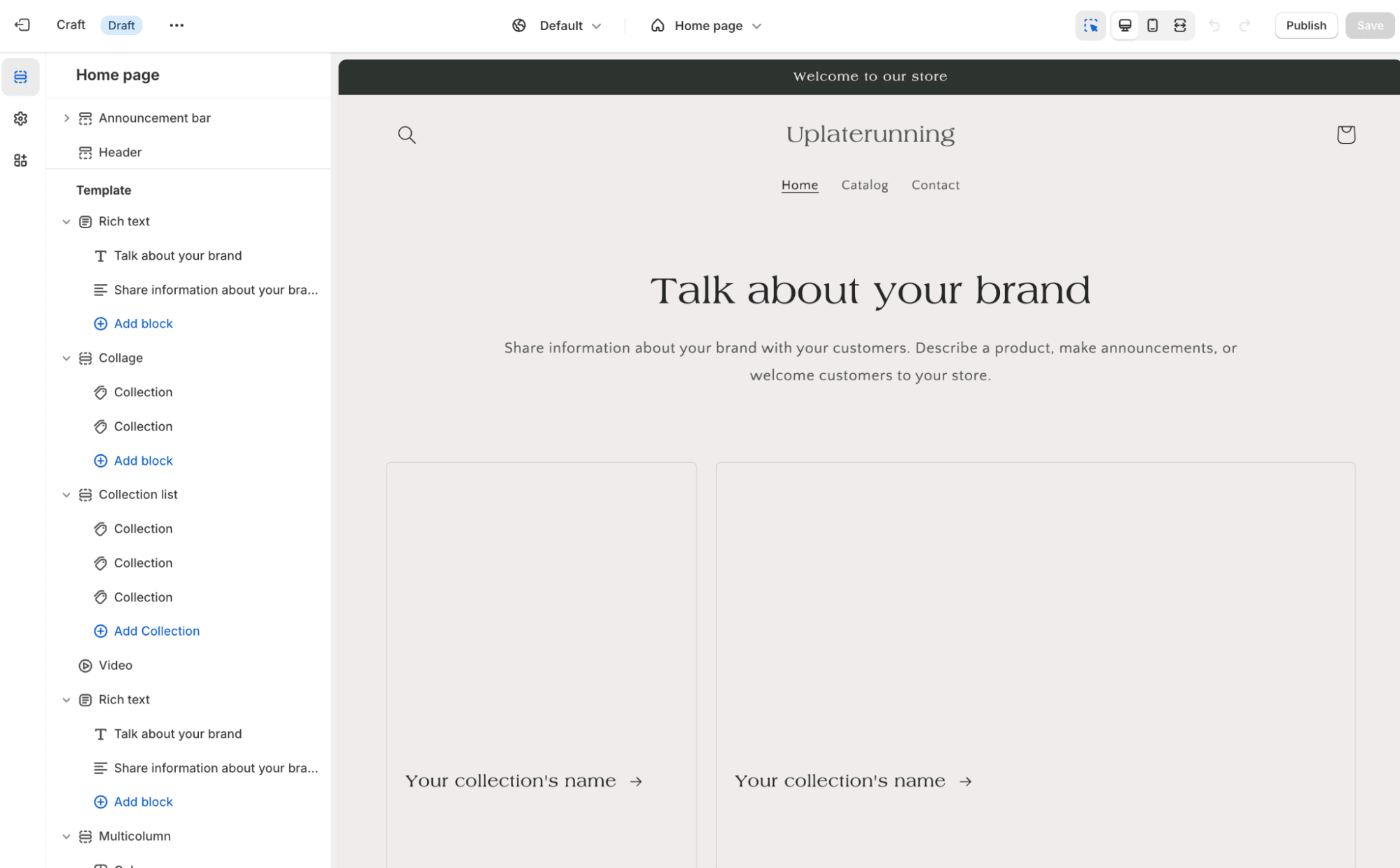
Shopify
Shopify Specifications
Free domain: Yes, branded domain through myshopify.com
Bandwidth: Unlimited
Ecommerce: Yes
Mobile app: Yes
Analytics: Built-in
Shopify calls itself an "all-in-one commerce platform to start, run, and grow a business," and it powers the websites and online stores of millions of enterprises worldwide. Nineteen percent of the top 1 million eCommerce websites are made with Shopify, amounting to a total of 6.3+ million sites in 2023.
Shopify comes with all the ecommerce features needed to run an online store. This includes inventory tracking, performance metrics, and customer payment subscriptions. Plus, it can handle high volumes of sales and traffic, with unlimited products, bandwidth, and storage.
"We chose Shopify as a web builder for our small business because it helped us to get to market faster, and we didn't have the budget to hire a website developer to make the website from scratch,” says Sanjana Ragu, founder of Kosmic Rituals. “We also used Shopify hosting, and we're really happy with the site loading speed and analytics dashboard."
If you’re not setting up a full-blown online store, Shopify Lite might be a better option. With this, you can add a buy button to an existing website or blog
Users might need help with Shopify since it uses point-and-click navigation over a drag-and-drop system. You can choose to use a Shopify app builder like PageFly or get Shopify development services from Fiverr.
“I supplemented Shopify with PageFly for limitless customization. I've been able to improve my website's design and user experience, boost my conversion rates, and grow my business," says Ben Kuhl, CEO of Shelf Expression.
Shopify Features
Variety of professional templates and themes that are customizable with fonts, colors, and styles.
Thousands of apps to extend functionality, like SEO, marketing, inventory management, and customer support.
Built-in payment gateway and support for over 100 payment providers.
Manage your store on the go with Shopify’s mobile app.
24/7 support via phone, chat, and email.
Shopify Pros
Has the highest converting checkout on the internet.
Ideal for beginners due to its intuitive setup.
Scales well for both small and large businesses.
Secure platform with built-in fraud analysis and SSL.
Wide range of apps and themes allows for significant customization.
Shopify Cons
Monthly subscription fees, plus transaction fees if not using Shopify Payments, can be pricey for small businesses.
Only eight free templates to choose from (additional paid templates available)
If you have an existing website, it may be hard to transfer all your information into Shopify
Who is Shopify best for?
Retail businesses
Subscription-based services
Artists and makers
Dropshippers
Influencers
Small to medium-sized businesses
Enterprises
Shopify Pricing
Shopify Basic: $14/month
Shopify: $39/month
Advanced Shopify: $299/month
Find a Shopify Website Developer for Hire
6. GoDaddy
Best for: AI website building
Reasons to use GoDaddy
Fastest loading speeds
Personalized recommendations
24/7 tech support
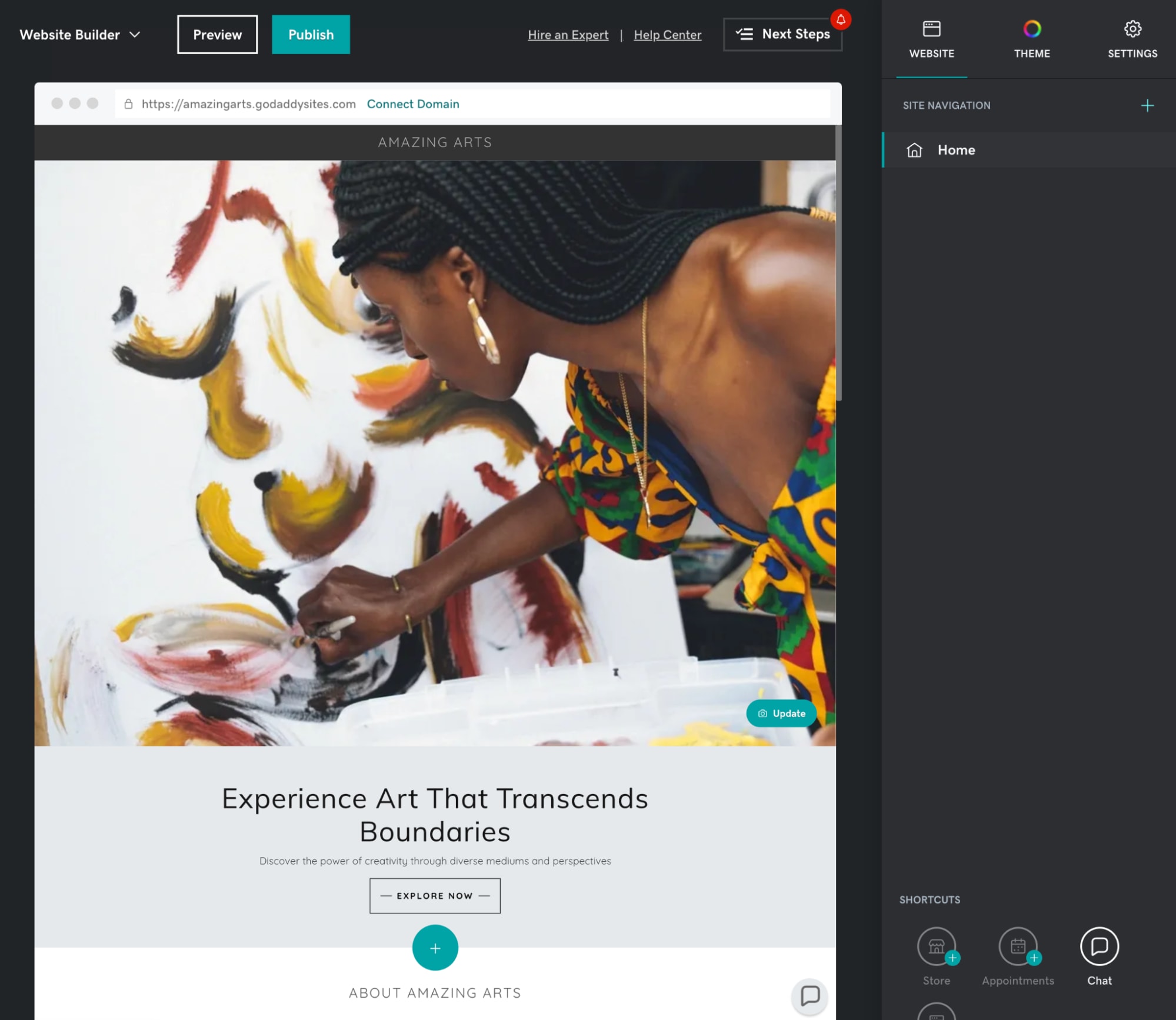
GoDaddy
GoDaddy Specifications
Free domain: Yes, with annual web hosting plan
Bandwidth: Unlimited
Ecommerce: Yes
Mobile app: Yes
Analytics: Yes, through the Google Analytics plugin
GoDaddy is a website builder and hosting company founded in 1997. And is one of the oldest and largest around, hosting over 40 million websites globally.
When you start, the GoDaddy website builder asks a series of questions about your business type, name, and the purpose of your site. This step helps the AI understand your needs.
Based on your answers, the AI suggests industry-relevant templates and layouts. For example, if you have a restaurant, it'll recommend layouts specific to menus and reservation features.
Once your website is live, the AI continues to monitor its performance and gives recommendations to improve traffic or customer engagement. For instance, it may suggest adding a call-to-action button, optimizing SEO, or integrating social media.
GoDaddy Features
Offers a range of customizable templates for different industries.
Mobile-friendly templates.
Ecommerce capabilities like product listing and inventory management.
On-site performance and customer behavior analytics.
Built-in marketing tools like SEO, social media, and email
GoDaddy Pros
It's user-friendly and requires no coding experience, so you can build a site in minutes
Offers the fastest loading speeds out of leading website builders
Responsive layouts that adapt to mobile devices
Provides an all-in-one solution for small business marketing
GoDaddy Cons
Not many options for customizing your template
Built-in SEO functionalities are poor compared to competitors
No app store is available, so integrations are limited
Launches a new website builder every few years, and older-version websites built are incompatible, leading to site owners having to rebuild regularly
Who is GoDaddy best for?
Small businesses
Entrepreneurs
Service-based businesses
Restaurants
Non-profits
Consultants
Personal websites
GoDaddy Pricing
Essentials bundle: $9.50/month paid annually.
Ecommerce bundle: $14.50/month paid annually.
Find a Webflow Website Developer for Hire
7. Webflow
Best for: Advanced customization
Reasons to use Webflow
Design flexibility
Integrated hosting
CMS functionality
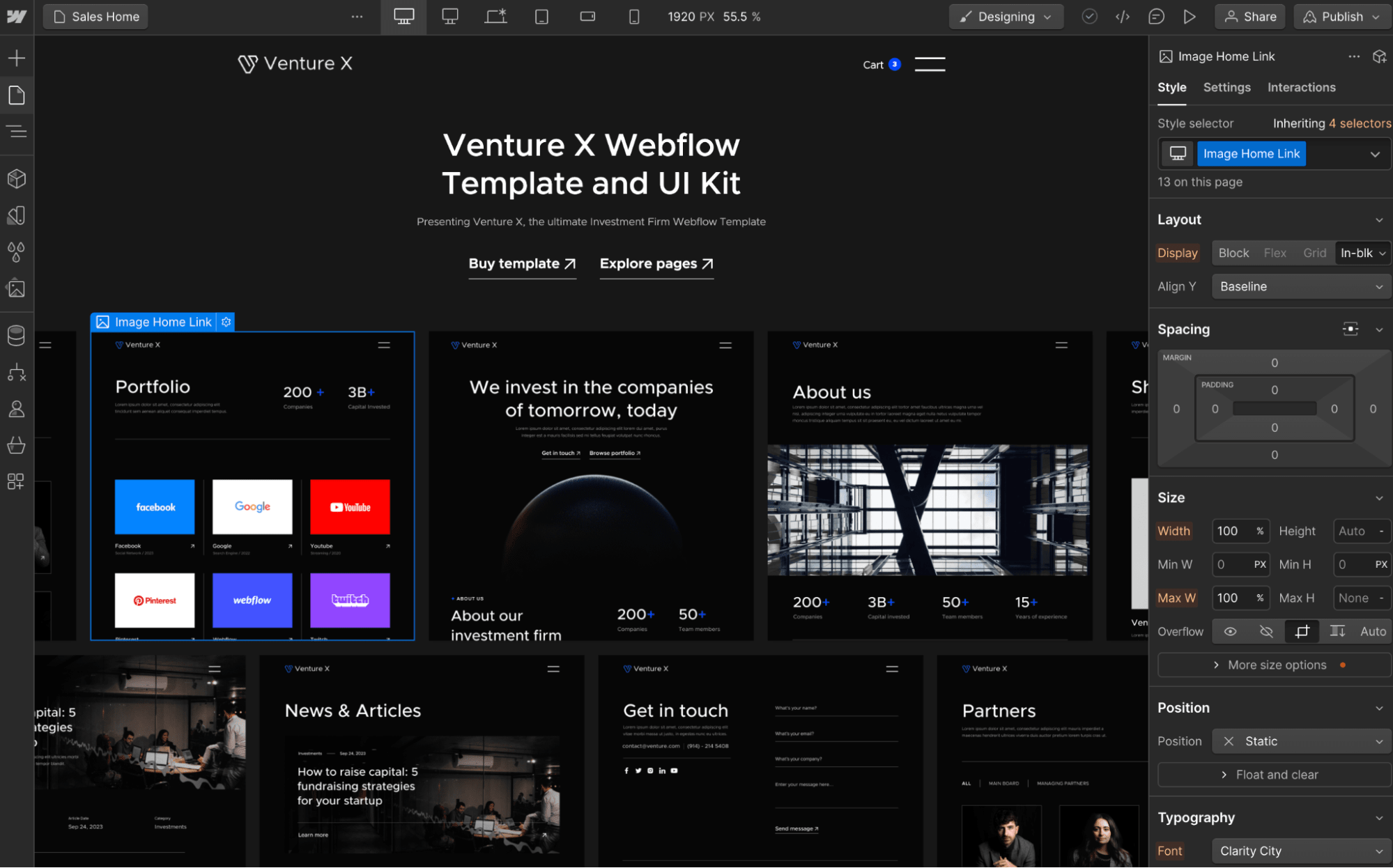
Webflow
Webflow Specifications
Free domain: No
Bandwidth: Unlimited
Ecommerce: Yes
Mobile app: No
Analytics: Yes, with Google Analytics integration
Webflow is a website-building software that allows users to design, construct, and publish professional websites via visual canvas that requires no coding.
Most website builders are simple solutions for businesses, but Webflow is a real contender for a fully custom-developed website. Unlike other drag-and-drop tools, Webflow offers granular customization and visual manipulation of every website element.
But this comes at the cost of ease of use. Webflow has a steep learning curve for anyone without coding knowledge. While Webflow is a no-code platform, its user interface will be familiar and easy for HTML and CSS coders.
Interested in using Webflow for your website? You might have to roll up your sleeves and spend some time at Webflow University. The other option: outsource your Webflow website building to a Fiverr expert, which would still work out cheaper than hiring a developer to build the entire site from scratch.
Webflow Features
Drag-and-drop interface for building layouts without coding.
Add custom HTML, CSS, and JavaScript for advanced designs.
Features for building online stores, managing products, and processing payments.
Built-in SEO settings, such as metadata customization and clean URLs.
Fast, secure hosting with CDN, SSL, and backups.
Advanced animations and interactions without writing JavaScript.
Team collaboration features for designers, developers, and clients.
Webflow Pros
Offers complete control over your website design, plus you can integrate your own HTML code or export your website's code if you switch platforms later
1500+ HTML templates
Webflow University offers helpful materials, including courses, videos, articles, and a user forum
Interactions and animation tools
Power Webflow layouts with custom CMS content
Webflow Cons
Free plan has monthly caps—up to 1k website visits and 1GB CDN bandwidth
Steep learning curve
Who is Webflow best for?
Designers
Developers
Marketing agencies
Startups
Freelancers
Portfolio websites
Educational institutions
Webflow Pricing
Starter plan: $0/month
Basic plan: $14/month when paid annually
CMS plan: $23/month when paid annually
Business plan: $39/month when paid annually
Find a Webflow Website Developer for Hire
8. Hubspot
Best for: Integrated sales and marketing tools
Reasons to use Hubspot
Scalable with robust integrations.
Learning resources.
Lead generation and management.
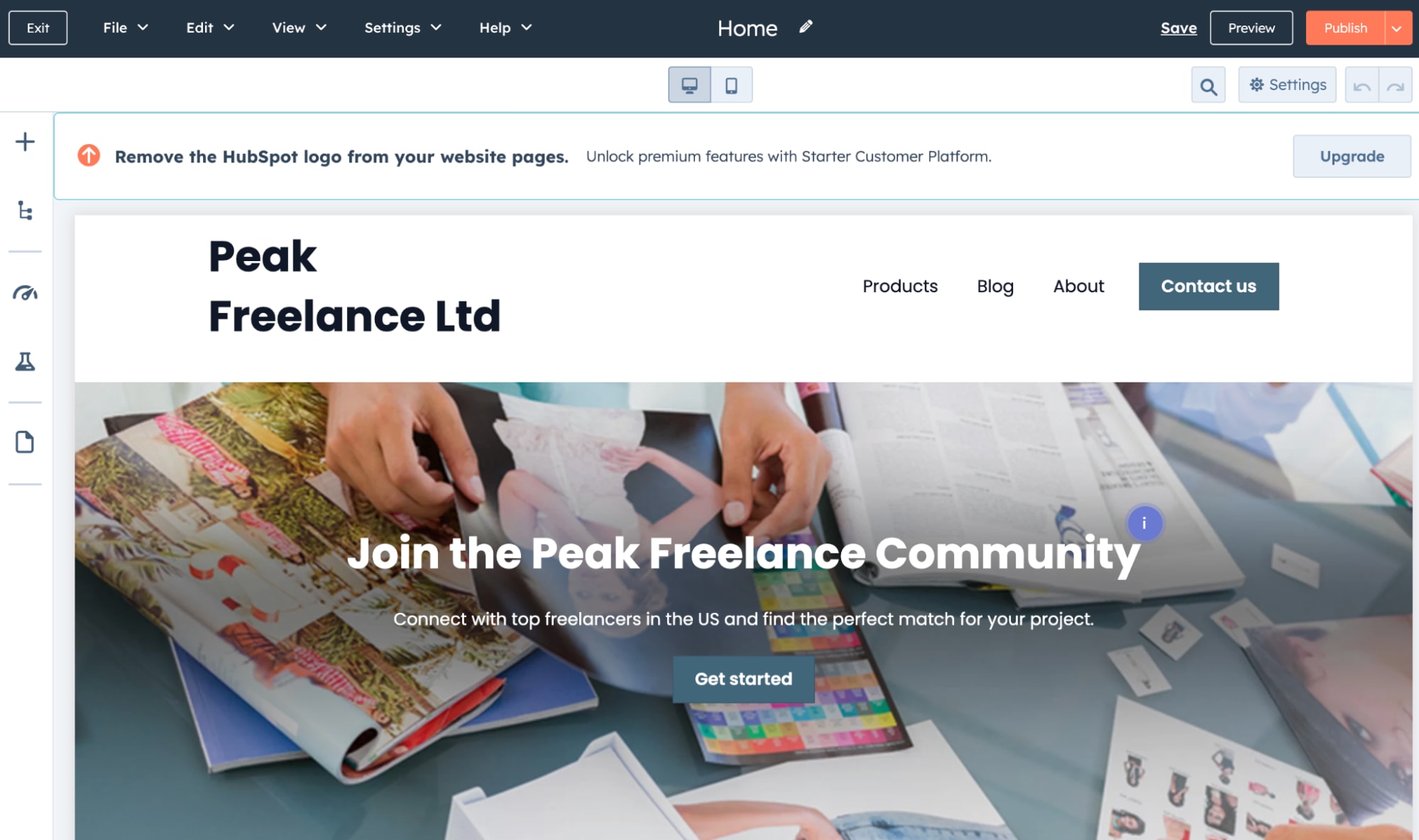
Hubspot
Hubspot Specifications
Free domain: No
Bandwidth: Unlimited
Ecommerce: Yes, integrates with most ecommerce platforms
Mobile app: Yes, CRM tools app
Analytics: Built-in
Hubspot is best known for its CRM (customer relationship management) software, but it also has a powerful drag-and-drop website and landing page builder.
The interface, reminiscent of familiar word processors, made content creation and layout adjustments straightforward. The AI website builder option further simplifies the process for those needing quick results. However, navigating between HubSpot's various tools might require a learning curve for new users.
HubSpot offers a range of pre-built website themes and templates, which I found to be modern and professional. Customization options are adequate for most users, allowing for easy adjustments to colors, fonts, and layouts. However, advanced users might find the customization depth somewhat limited compared to dedicated website builders.
HubSpot's strength lies in its integrated ecosystem. It offers seamless connections between the website builder and HubSpot's CRM, marketing, and sales tools.
Hubspot Features
Free drag-and-drop tool
Pre-built website themes and templates
No prior coding or design knowledge is necessary
Free SSL security certificate
Free premium cloud hosting
Hubspot Pros
Integrates with HubSpot tools
AI website builder option
Built-in SEO tools
Scalable with modular features
Hubspot Cons
No live customer support
Hubspot branding on all website pages
Can’t modify system pages (such as 404 error)
Who is Hubspot best for?
Marketing agencies
SaaS businesses
Service providers
Ecommerce businesses
Educational institutions
Consultants
Small businesses
Hubspot Pricing
Free
9. Weebly
Best for: Freemium users
Reasons to use Weebly
Intuitive website builder
Basic ecommerce tools
Powered by Square
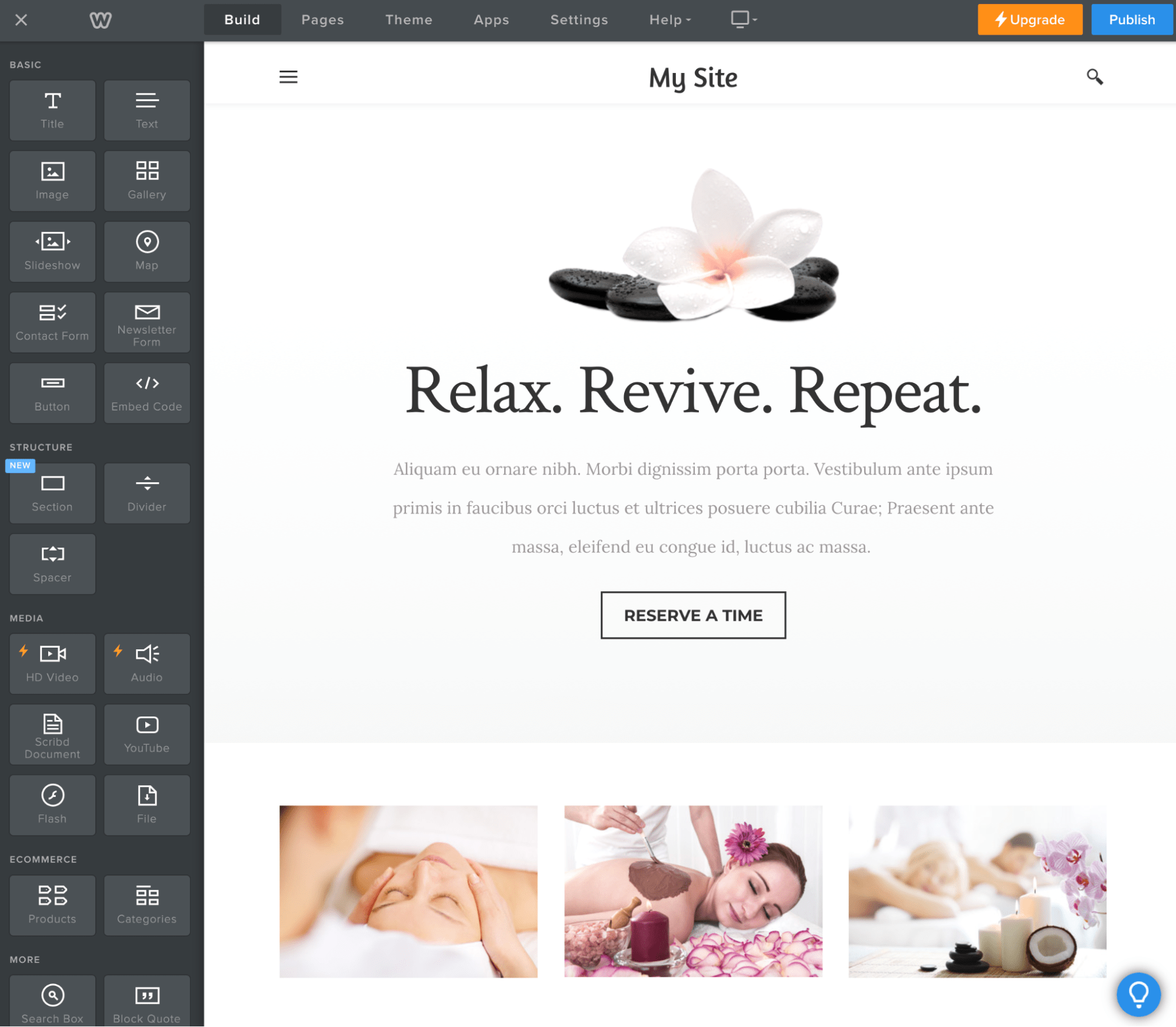
Weebly
Weebly Specifications
Free domain: Yes, a free Weebly subdomain
Bandwidth: Unlimited
Ecommerce: Yes
Mobile app: Yes
Analytics: Yes, with the Google Analytics plugin
Weebly is one of the best free website builders and is a great option for simple service businesses and ecommerce websites. But note that Weebly doesn’t offer advanced online store features like Shopify and BigCommerce.
Users get a free version, but it doesn’t include a custom domain. This can be a deal-breaker for many small businesses since having ‘Weebly’ in the domain might reduce credibility.
Weebly's drag-and-drop builder is highly intuitive and user-friendly. While limiting some design freedom, the grid-based structure ensures that even beginners can create professional-looking sites quickly.
Weebly's free plan is generous, making it an excellent option for users on a tight budget. However, our analysis showed that the lack of a custom domain on the free plan could be a significant drawback for businesses
If you don’t have the time to work on Weebly’s builder, consider getting Weebly website development services on Fiverr.
Weebly Features
Drag-and-drop builder with customizable templates.
Full online store capabilities, including payment and inventory management.
Edit and manage the site via mobile apps.
Create and customize a blog.
Integrate third-party apps for additional features.
Tools to optimize search engine visibility and monitor performance.
Weebly Pros
Accessible for beginners.
Can get the website live quickly.
Affordable plans.
Responsive templates
Weebly Cons
Drag and drop is structured to a grid, preventing design freedom
Limited in-built SEO features
Slower in rolling out new features
Difficult to migrate from Weebly to another platform
Customer service isn’t always responsive
Who is Weebly best for?
Freelancers
Small business owners
Personal bloggers
Simple ecommerce stores
Restaurants
Artists
Consultants
Weebly Pricing
Free plan: $0/month
Personal plan: $6/month
Professional plan: $12/month
Performance plan: $26/month
Find a Weebly Website Developer for Hire
Build your own website today
There isn't a one-size-fits-all solution when it comes to using a website builder. Business owners should weigh the pros, cons, and pricing based on their type of website.
If you’ve put off designing your website for long enough, get started with an easy site builder so your website is up and running. You can always work on scaling and growing your website along with your business in the future.
If you need help creating your website, you’ll also find plenty of assistance from Fiverr’s wide range of web builder experts.
Sign up to Fiverr today to get started.
Website builders FAQs
What is a website builder?
A website builder is a tool that allows you to put together a website without coding or programming. It typically has a visual interface and a set of templates, widgets, and themes that can be used to customize the look and feel of the website.
What are the benefits of using a website builder?
With a website builder, anyone can create a professional website quickly and improve their online presence. Website builders can also offer mobile responsiveness as a top feature and don’t need to be coded separately for different devices. Other benefits of a website builder include in-built performance tracking, hosting, and domain management.
What is the cheapest website builder?
Webflow, Weebly, Wix, and WordPress all offer free plans with basic functionality. For more advanced features, however, Zyro and Jimdo are the most affordable.
How long does it take to build a website?
While most website builders boast that they allow you to create an online business website within minutes, the reality is that it takes a little longer to complete this task. You must also consider adding content, images, pages, and subpages to your website, all of which can take hours or days—depending on how much you’ve already prepared.
How much does a small business website cost?
Even if you use a website builder with a free plan to create your site, you must still factor in upfront costs such as:
Domain registration (averaging $12 - $60)
Website hosting (averaging $35 - $600)
SSL certificate (averaging $0 - $200)
Your website template or theme (averaging $0 - $200)
Apps and integrations (averaging $0 - $100)
Support with elements such as digital marketing, SEO, or content creation (which, depending on the level of assistance you receive, can cost anywhere from less than $100 to a few thousand dollars).
Which website builder is easiest to use?
Weebly’s simple interface and drag-and-drop editor make it the easiest website builder for those with zero experience designing websites.
Can you build a website alone?
It is possible to build websites alone using one of the website builders aimed at design novices. However, if you require complete control over your site's design and customization, and want the highest level of functionality, hiring a web designer is the ideal choice. With Fiverr, you can find thousands of experienced web designers who can create a website within your budget.
